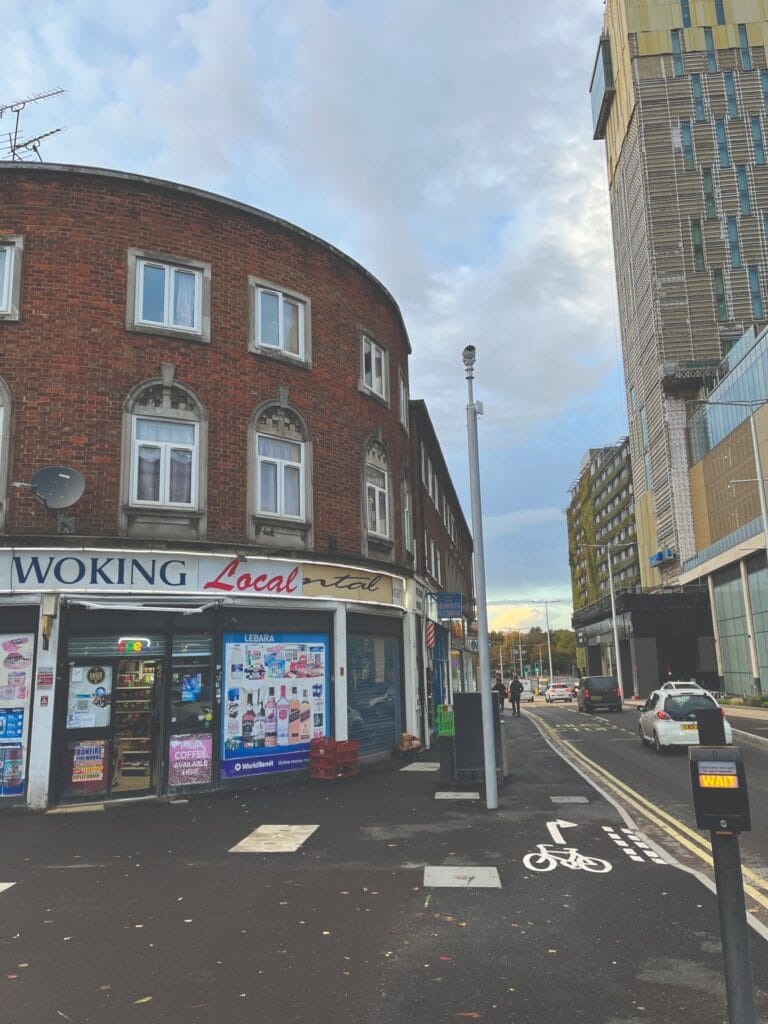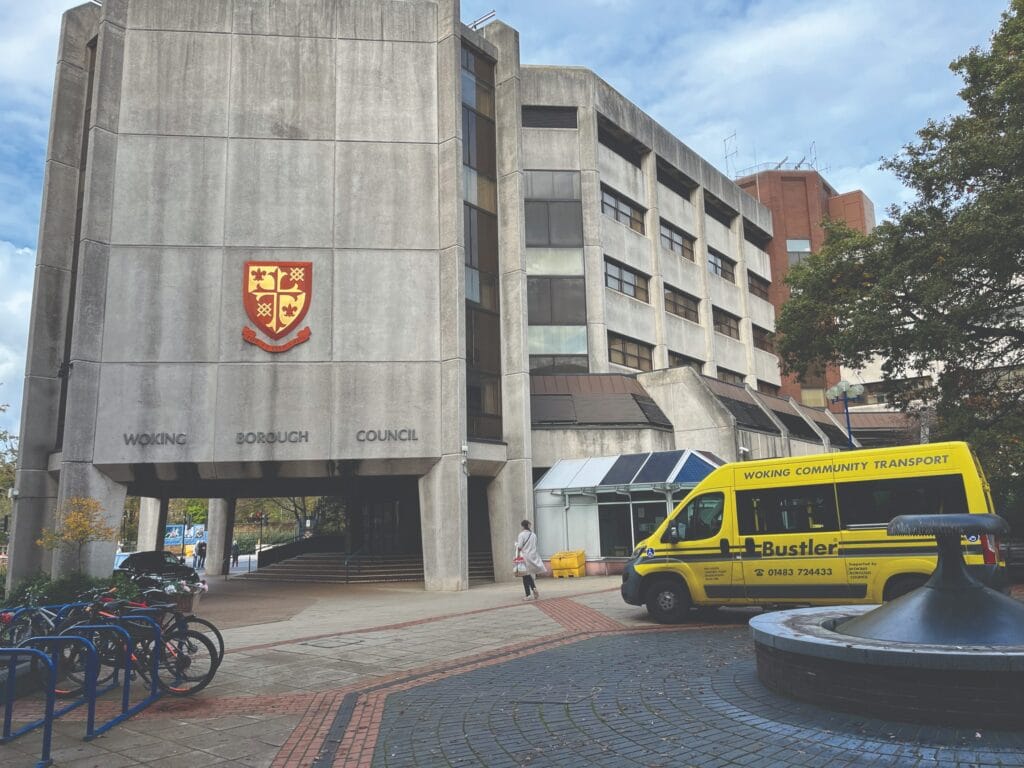The coming storm
UK councils are in crisis, and July 2023 saw Woking’s local authority frantically cutting its services in an attempt to claw its way out of effective bankruptcy. Two months later Birmingham council, which provides services to more than a million people, also went bust. What led them to failure? And what does their collapse tell us about a broader threat to local government across the UK?

Dark clouds gather over central Birmingham in September 2023 as its council becomes the fourth – after Croydon, Thurrock and Woking – to effectively go bankrupt in a year. Photo: Mike Kemp/Contributor/Getty Images
11th July 2023 (Taken from: #52)
On 11th July Woking council presented residents of the English town with a series of unappetising choices. They were asked whether they would prefer to lose their public toilets, end the upkeep of 13 sports pavilions or begin the phased closure of Pool in the Park, the much-loved local swimming baths. These miserable options were just a small part of a swathe of cuts mooted by councillors since they were forced to issue a ‘section 114’ notice – an effective declaration of bankruptcy – on 7th June.
“It’s just horrendous,” says council leader Ann-Marie Barker of the cuts. “But it’s what we’ve got to do to try and balance our books.” The figures give her little option. In recent years Woking has amassed loans of £1.8 billion, repayments on which are eye-watering. “Our total [annual] income is £46 million, and we’ve got £62 million a year of borrowing to pay back,” says Barker. That’s an annual shortfall of £16 million before a single basic council service has been provided or a single council employee paid. It leaves Woking as the single most indebted local authority relative to its size in British history.
Woking acquired its monster debts not under Barker’s Liberal Democrat-led council, which only took over in 2022, but under a previous Conservative administration, which ruled from 2011 to 2018. Fired by the idea of turning the town into the ‘Singapore of Surrey’, the council borrowed heavily to invest in redevelopment projects that saw skyscrapers and new shopping malls constructed in the centre, leaving residents navigating a vast, shifting building site for years on end.
The plan was that commercial rents would cover the cost of borrowing and provide new income to fund ever-improving council services. “Woking did it all with the best of intentions,” says Barker, who admits that she and her fellow Liberal Democrats did support some of the borrowing.
Woking’s real estate investments were prompted by the British government of the time, which cut funding to local authorities by an average of 38 percent between 2010 and 2017, and encouraged councillors across the country to be more ‘entrepreneurial’ to bring in revenue to bridge the gap. “During the coalition years of 2010 onwards, David Cameron was keen to say, ‘Look, there’s the Public Works Loan Board. You can use that to regenerate your areas, to invest in your areas’,” says Barker. “So people took that opportunity. And unfortunately, councils like Woking went too far, borrowed too much.”
Around fifteen percent of English councils borrowed to invest in new commercial portfolios. These were signed off by councillors with mandates limited to the minority of voters who turn out for local ballots, on average just 36 percent. Much of this council investment took place after 2015, by which time several years of austerity cuts had made radical ideas seem more appealing. Central oversight was limited after communities secretary Eric Pickles shut down the Audit Commission, whose task was to scrutinise local government spending, in 2015. Some councils did well from investments – others did not.

The centre of Woking: on the right-hand side is part of the Victoria Square development, including a high-rise building, yet to open, that will be home to a Hilton hotel. Photo: Rob Orchard
In Woking, says Barker, “It was the big thing to go out and buy things… to make things happen. But the structures weren’t put in place behind that. There was a lot of commercial property [investment], but there was no money put aside to do maintenance, repairs and refurbishment.” Expertise was lacking among full-time council staff, she says, and insufficient provision was made for unexpected setbacks. “They’d put aside a small amount, but not enough to ensure that on a rainy day the borrowing could be repaid.”
The government can’t just say ‘Here’s some money, Woking’”
And then came the ultimate rainy day. The Covid-19 pandemic cleared everyone off the streets and out of the shopping centres of Woking, leading to a precipitous drop in the council’s revenue from parking fees and business rates. It made the value of commercial real estate plummet, contributing to a massive write-down in the value of the council’s assets. And it ushered in a new era of working from home, aka WFH, three letters that spelled disaster for the town’s swathes of new office space. The Singapore of Surrey had been built on over-optimistic foundations and the only people to benefit from the years of disruption would be the auditors dispatched to assess the damage.
Barker and her fellow councillors are working with government-appointed advisors to raise money by disposing of council assets, but that will take time. “You obviously don’t want a fire sale because that will just flood the market, you’ve got to have a considered programme as to what you’re going to sell,” she says. Council tax can only be raised by a small amount without a referendum and as Barker points out, even if it were raised by ten percent, it would only bring in an extra £1.1 million a year, just seven percent of the shortfall.
The only option for the moment, then, is to cut everything which the council does not have a legal obligation to provide – statutory services like education, child safeguarding and social care. Every discretionary service is at risk. “We will need government help and support, but they’re not going to give us any unless we’re trying to put our own house in order,” says Barker. “They can’t just say, ‘Here’s some money, Woking’, that would set an awful precedent.”
Local authorities are required by law to have balanced budgets. If they cannot do this without help, they must issue a section 114 notice. Not a single one of these distress signals was issued between 2000 and 2018, but in the last year there have been four.
There was Croydon, which declared itself bust for the second time in three years in November 2022, Woking, and Thurrock, which collapsed in December 2022 and now has debts of about £1.3 billion. These councils had one thing in common – risky investments which backfired. None was more notorious than Thurrock, which lost nearly £200 million on funding solar farms, in a deal orchestrated by an entrepreneur who, according to an investigation by BBC Panorama and the Bureau of Investigative Journalism, used the money he made to enjoy a lavish lifestyle, including purchasing a yacht and private jet.
And then on 5th September Birmingham, Europe’s biggest local authority, declared effective bankruptcy. While the council was not culpable of bungled investments, it had announced weeks earlier that it still had to pay up to £760 million to settle equal pay claims, the result of a 2012 supreme court ruling over its underpayment for jobs traditionally done by women. It had already paid out £1.1 billion in such claims. The council’s financial woes were compounded by an £80 million overspend migrating many of its financial admin tasks to a new Oracle IT system.
Birmingham’s financial woes were compounded by a singular set of circumstances. However, when its council’s leader and deputy leader, John Cotton and Sharon Thompson, issued their section 114 notice, they emphasised that the city wasn’t alone in its suffering. “Like local authorities across the country, it is clear that Birmingham city council faces unprecedented financial challenges,” they wrote. “From huge increases in adult social care demand and dramatic reductions in business rates income, to the impact of rampant inflation, it is clear that local government is facing a perfect storm.”
I can’t shy away from the fact that the situation is desperate”
On 11th September 2023, Moody’s credit rating agency issued a warning that several other English councils were on the verge of failing. On 29th September, trade union Unison presented data showing that almost a third of councils in England, Scotland and Wales faced shortfalls of more than £10 million for the coming financial year.
With only 14 percent of councils polled saying they were able to balance their books, Unison warned that Birmingham was “the tip of the iceberg” and that many councils were “teetering on the brink” of bankruptcy. And then on 19th October the Local Government Association (LGA) wrote to British chancellor Jeremy Hunt to warn him that even well-run councils would start failing without an injection of central government funding. The risk of insolvency, the LGA said, was now universal due to unprecedented financial pressures.
On the same day that Unison released its findings, Havering council published a disquieting statement on its website. “I’m afraid I can’t shy away from the fact that the situation is desperate,” wrote council leader Ray Morgon. “We are now at the point where bankruptcy could happen in the next six to 12 months.” In a wood-panelled meeting room at Havering Town Hall in Romford, Morgon reiterates the point he made in his public statement, that his council hasn’t made commercial investments and is “well-run, low-cost and efficient”.
“We may be one of many councils that have to issue a section 114 notice through no fault of their own,” says the 61-year-old member of the Havering Residents’ Association, which is in a power-sharing arrangement with the local Labour party. He says that they’re doing everything possible to balance the books, but they’re now at the stage where whatever they do is unlikely to be enough.
“The problem is the increased demand for social care and housing,” Morgon says, explaining that more than 70 percent of the council’s spending goes on social care for adults and children. “Most residents think their council tax is used to pay for collecting their rubbish or cleaning their streets and are shocked that most of it goes on adults’ and children’s services. But according to the law [local councils] have to provide these services to anybody who meets the criteria to be helped,” he says.
After many years of cuts – Morgon says that Havering’s central government grant has decreased from £70 million in 2010 to under £2 million in this financial year – the council can no longer afford to provide these statutory services. The situation hasn’t been helped by suppliers of social care services drastically raising their fees. Morgon says that one care home that until recently charged the council £800 a week per resident now wants £2,000 a week. He also claims that the council is being charged £30,000 a week to keep just one minor in a secure children’s home. “That’s a million and a half quid a year, almost equivalent to the grant that we get from central government, spent on a single child. Surely that can’t be right or sustainable?” he says.
Morgon acknowledges that rising supplier prices are in part due to increased staffing costs post-Brexit as well as rising energy bills and other inflationary pressures, but suspects that some firms are also “making huge profits”. An October 2023 Guardian report revealed that the 20 biggest independent providers of children’s care in England made profits of more than £300m last year.
The sharp price rises have come at a time when demand is rising. Local authorities are spending almost twice as much on children’s care as they were ten years ago and in November 2023 the County Councils Network said that “out of control” increases in child protection spending, driven by a steep rise in demand for children’s services since the pandemic, are putting one in ten of its councils at risk of issuing section 114 notices within a few months.
Morgon’s biggest gripe with local government funding, however, is that the formula used to allocate money to local authorities relative to their needs is “massively out of date”. It hasn’t been updated in ten years, he says, and the data it relies upon is even older. During this period Havering’s demographics have significantly changed. Its population has grown by 10.5 percent since 2011 and a disproportionate number of new arrivals are young or elderly; the council has the second fastest-growing child population in the UK and Havering has one of London’s oldest populations. Meanwhile, many landlords that previously rented to the council have been selling their properties, unable to service rising mortgage interest rates, meaning more evictions and a smaller supply of accommodation during a burgeoning homelessness crisis.
When asked if the Department for Levelling Up, Housing and Communities is receptive to his concerns, Morgon laughs. “They’re kind of like, ‘You’re in this difficulty – what are you going to do about it?’. Well that’s why we’re talking to you!” he says. “We’ve been offered a capitalisation order, which is effectively a loan from the Public Works Loan Board. And for that they charge you an extra one percent on top of the normal rate. Well thanks ever so much, that’s really going to help us. They just don’t get it.” The Department for Levelling Up, Housing and Communities did not respond to our questions.
On 8th November 2023, Havering council unveiled its own planned cuts. It has proposed making £12 million in savings through measures including shutting libraries, raising parking fines, closing Romford Market on Sundays and ending all spending on Christmas celebrations. “We know these are not popular decisions,” says Morgon. “But when we tell people that we might be six to 12 months away from bankruptcy we’re not joking. It’s not what we want to do, but we have to do it.” And yet going the full Scrooge and turning the festive lights off still won’t be enough. Havering’s budget gap is £31 million next year, so with £12 million of savings they’re still £19 million off balancing their budget. The council’s reserves are “very low”, according to its budget plan.
We got a phone call out of the blue to say… your funding is going to be cut by 100 percent”
Havering is peering over the edge of the cliff. As is the case with many other local authorities that have warned of imminent effective bankruptcy in recent months – Nottingham, Hastings, Kirklees, Southampton, Guildford, Leicester and several others – the first wave of stories of risky investments gone awry or equal pay claims no longer apply. “Until now [central government] has been able to say ‘it’s your fault’,” says Morgon. “But when boroughs like Havering that haven’t done anything wrong issue section 114 notices, hopefully they’re finally going to think ‘We need to do something’.”
The effects of the coming storm of council bankruptcies will be felt most keenly by providers and users of ‘non-essential’ services. One victim of the scramble to revive Woking’s finances is the Bustler, a not-for-profit ‘dial-a-ride’ service whose bright yellow buses can often be spotted about the town. Supported by an annual grant of £175,000 from Woking council, the Bustler picks up people with disabilities or reduced mobility that make it difficult for them to travel on public transport, and takes them wherever they want for a small fee.
“We have just over 4,000 members, over 90 percent of whom are low-income pensioners,” says CEO Guy Padfield-Wilkins. “It’s a proper door to door service – the drivers turn up, they may get a key to let themselves in, they make sure that [the client’s] okay, help them get their coat on, get their bag, lock their property, help them get into the vehicle. We’re not talking about a taxi that turns up and beeps its horn outside. Because the dial-a-ride service is subsidised, clients can afford to travel to go food shopping, to the dentist, to see friends – social inclusion, you know. Otherwise they are stuck in a house all day looking at four walls.”

One of the Bustler dial-a-ride vans drives past the offices of Woking council. The Bustler service is at risk of closure thanks to budget-cutting by the council. Photo: Rob Orchard
In October 2023, says Padfield-Wilkins, “We got a phone call out of the blue to say ‘There are proposals going forward that mean that your funding is going to be cut by 100 percent next year.’” Not just that, he says, but the council also plans to sell the offices the Bustler works out of and the garage where it keeps its vehicles.
The council has suggested that Padfield-Wilkins could pass the increased costs of the Bustler on to users, but he says it’s not feasible. “Our clients currently pay about £4.80 on average to travel anywhere in the borough. If we were to pass on just the funding reduction, then those figures would need to go to £24,” he says. “Fewer people would be able to travel, so you’d have to increase the fares again. It would just go higher and higher until only the very wealthiest people in Woking will be able to afford it. And then it’s no longer a community service.”
Padfield-Wilkins is very passionate in defence of his clients, and agonises over what they stand to lose if the Bustler is cut. “We’re talking about a cohort of people who were already told to isolate for the longest period of time [during the pandemic], and we’re still hearing of the consequences of that self-isolation,” he says. “That was for a medical reason, they had to do it. This is just over money.” But it would seem that Woking council’s need to prove to central government that it is serious about cutting its budget – and therefore deserving of a bailout – trumps everything. “There’s not even any suggestion of reducing the service”, says Padfield-Wilkins. “Halving the funding and halving the service, that’s not even on the table. It has to be a 100 percent cut.”
The Bustler is fortunate in one regard. As an independent organisation, it is able to protest publicly about its fate. “If we look at our neighbouring boroughs – Guildford, Spelthorne, Surrey Heath, Runnymede, Elmbridge – all of their community transport is run by the council in-house,” says Padfield-Wilkins. “So if they find themselves in financial difficulty, the council will just cut them. There will be no consultation. There will be nobody like me to talk to you and say ‘This is outrageous’. If they find themselves in difficulty, the community transport – and the other inhouse services – will just go, and go very quietly.”
The team at the Bustler are acutely aware that for all the pain that will be caused by their grant being cut from the budget, it will make precious little difference to Woking council’s yawning deficit. “It will have no effect at all,” says Padfield-Wilkins, “but a huge impact on those that rely on the service.” Making further cuts to repair the damage done by ill-advised borrowing designed to make up for a previous set of cuts is, he suggests, a false economy. In the case of the Bustler, he believes that “it will ultimately lead to increased costs for the NHS because people will start to miss their doctors’ appointments, medical conditions will start to get worse because they won’t be able to get out of the house, there’ll be no social inclusion, there’ll be higher mental illness reported. It’s just very short-termism. You cut now but the consequences will be dire in years to come.”
Slow Journalism in your inbox, plus infographics, offers and more: sign up for the free DG newsletter. Sign me up
Thanks for signing up.








